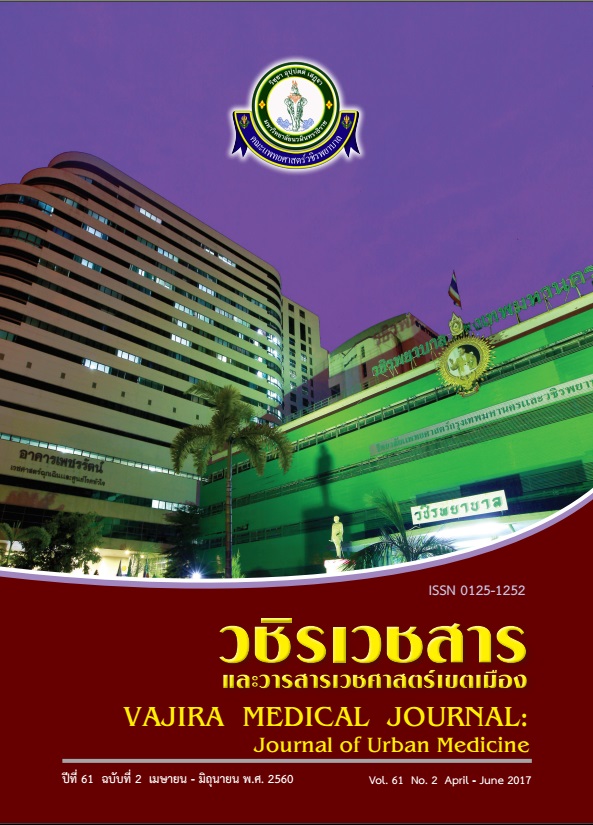Effect of Family Medicine-based Care on Quality of Life of Breast Cancer Patients
Main Article Content
Abstract
Purpose: To compare the quality of life between patients with breast cancer who received family medicine-based care and those who received conventional care.
Methods: This was a cohort study, non-parallel group (different time, historical control). We compared the quality of life (using WHOQOL–BREF–THAI) between patients with breast cancer who received family medicine-based care and the other group who received conventional care. Demographic data and quality of life were collected from our hospital database. Forty-two (42) patients who received family medicine-based care were included as the experimental group, and 42 patients who had received conventional breast cancer care were included as the control group. Demographic data and quality of life were collected between December 1, 2016 and June 30, 2017. The data were statistically analyzed using chi-squared test for the difference of outcomes.
Results: In both groups, the most common age of diagnosis was between 35 and 45 years. Patients were diagnosed earlier (Stage 1-2) in the experimental group (p<0.05). Complications related to surgery, chemotherapy and radiation therapy were not statistically different in both groups. Other demographic data and socioeconomic status were not statistically different in both groups. The quality of life (QOL) in terms of mental health, social relationships, environmental relationships and overall QOL were higher in the experimental group. (p<0.05)
Conclusions: Family medicine-based care is useful for improving quality of life of patients with breast cancer and could be applied to other diseases.
Downloads
Article Details
References
2. de Haes JC, van Oostram MA, Welvaart K. The effect of radical and conserving surgery on the quality of life of early breast cancer patients. Eur J Surg Oncol. 1986; 12: 337-42.
3. Schain WS. Breast cancer surgeries and psychosocial sequalae: implications for remediation. Sem Nurs Oncol. 1985; 1: 200-5.
4. Ganz PA, Coscarelli A, Fred C, et al. Breast cancer survivors: Psychosocial concerns and quality of life. Breast Cancer Res Treat. 1996; 38: 183-99.
5. Division of Nursing Services, Department of Health, Bangkok Metropolitan Administration. Home Health Care. Bangkok: Department of Health; 2012. p.2-19, 21-77.
6. National Health Security Office Section 13 and the Office of Public Health and Environmental Technology Services. Faculty of Public Health, Mahidol University. Handbook of Home Health Care in Bangkok City. Bangkok: HR Printing; 2008. p.5-30.
7. Mahatnirankul S. Quality of Life Measurement. Bangkok: Department of Mental Health. Ministry of Public Health; 1998. p.15-25.
8. Vayurakul V. Family Care Process. Pathum Thani: Department of Family Medicine. Faculty of Medicine Thammasart University; 2015. p.1-8.
9. Watanakit P. Family Care Team and Family Care Process. Active Health Care. Chiang Mai: Faculty of Medicine Chiang Mai University;1998. p.12-40.
10. BMA General Hospital Administration. Annual Report for the BMA General Hospital Administration Board; 2015. p.5-9.
11. McWhinney IR. A Textbook of Family Medicine. 3rd ed. New York: Oxford University Press; 2009. p.13-28.
12. Department of Health, Bangkok Metropolitan Administration. Standard of Mental Health Care Services. Bangkok: Department of Health; 2007. p.24-45.
13. Wanpira V. Home Visit and Home Care. Phitsanulok: Department of Family Medicine. Faculty of Medicine Naresuan University; 2012. p.1-57.
14. Sornklin O. Home Visit. Chiang Mai: Department of Family Medicine Chiang Mai University; 2000. p.1-12.
15. Unwin B, Jerant AF. The home visit. Am Fam Physician. 1999; 60: 1481-8.
16. Michael YL, Berkman LF, Colditz GA, et al. Social networks and health-related quality of life in breast cancer survivors: a prospective study. J Psychosom Res. 2002; 52: 285-93.
17. Walsh D, Regan J. Terminal care in the home-the general practice perspective. Ir Med J. 2001; 94 (1): 9-11.
18. Perry SH, Kowalski TL, Chang CH. Quality of life assessment in women with breast cancer: benefits, acceptability and utilization. Health Qual Life Outcomes. 2007; 5: 24-38.
19. Pitayaratanasatean N, Malarat P. Quality of life and depression in post-surgery breast cancer patients in Chulalongkorn Hospital. Chulalongkorn Med J. 2008; 3: 205-16
20. Chancharupong C. Effects of the holistic health care on quality of life in chemotherapy breast cancer patients. J Altern Med. 2006; 2: 22-5.


